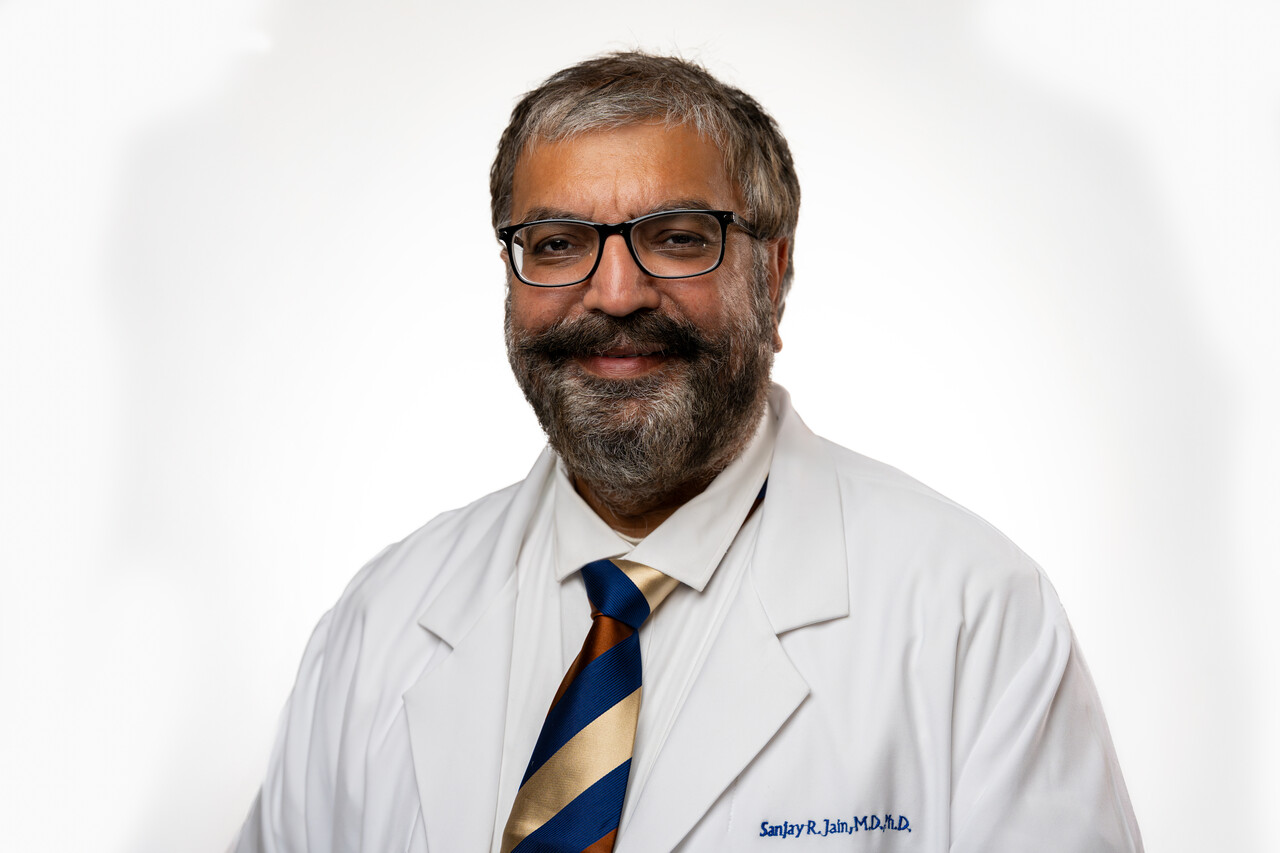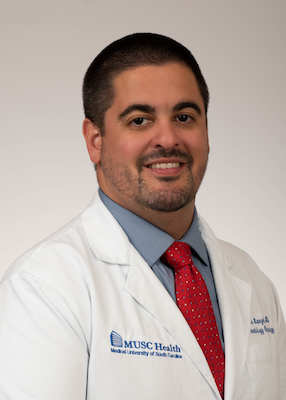Lung Cancer Diagnosis
We use state-of-the-art equipment to determine the type and stage of your cancer and decide on the optimal treatment.

With the latest diagnostic tools and innovative treatments at the ready, the Lung and Thoracic Cancer Care Team at MUSC Hollings Cancer Center will talk to you about your options and collaborate to design the best possible treatment plan for you.
Thoracic cancers are any cancers that begin inside your chest cavity. The most common thoracic cancer is lung cancer, which is also the third most commonly diagnosed cancer in South Carolina. The experts on our team specialize in identifying and treating lung cancer and a variety of other thoracic cancers:
MUSC Hollings Cancer Center has been recognized as High Performing in Lung Cancer Surgery in the 2025–2026 U.S. News & World Report rankings. This distinction underscores our commitment to delivering life-saving treatment using the latest technologies and techniques.

Our multidisciplinary team includes pulmonologists, oncologists, radiation oncologists, surgeons, nurse practitioners, physician assistants and researchers. Our experts don’t stop at providing top-notch care — they’re also working tirelessly to discover the next cutting-edge treatments. A novel combination immunotherapy treatment developed at Hollings for advanced non-small cell lung cancer (NSCLC) that has continued to grow after initial treatment is now being tested through a nationwide clinical trial. And Hollings is expanding access to lung cancer screenings for veterans and populations without access to regular medical care so that potential lung cancers can be diagnosed and treated earlier.
Lung cancer is the third most common cancer in the U.S. and the most common type of thoracic cancer. It accounts for more cancer deaths than any other type of cancer.
A full 90% of lung cancers are linked to smoking. The best way to prevent lung cancer is to not smoke, or to quit if you do smoke. We offer you help quitting through our Smoking Cessation Program and the Tobacco Treatment Program. Long-time smokers can benefit from annual screenings, which can catch lung cancer early when it hasn’t spread and is easier to treat.
Have more questions about lung cancer? Check out our answers to common questions.
We use state-of-the-art equipment to determine the type and stage of your cancer and decide on the optimal treatment.
If you're at risk, catching lung cancer early through regular screenings will help increase your chance of survival.
Quitting tobacco use is one of the most beneficial things you can do to help improve your treatment outcomes.
In early stages, lung cancer and other thoracic cancers often have no signs or symptoms, making them hard to diagnose. While symptoms of lung and thoracic cancer will vary depending on the type and location, possible signs can include:
If you are experiencing any of these symptoms, it's important to talk with your doctor to make sure they do not indicate cancer. An imaging test like an X-ray, ultra-sound, computed tomography (CT) or magnetic resonance imaging (MRI) can help identify any unusual areas in your chest, and a needle biopsy can confirm whether or not there are any cancer cells present.
With every single one of my physicians, I had a unique connection because they care. They listen. They don't rush you in and out. They'll shoot it to me straight, every single one of them.
The number of people who survive and thrive after receiving a lung or thoracic cancer diagnosis is steadily rising thanks to greater awareness, fewer people smoking, better early detection, and advances in treatment.
Our Lung and Thoracic Cancer Care Team offers the highest quality, most advanced cancer treatments available today. Our team of specialists uses state-of-the-art technology and procedures to determine the stage and size of your cancer and whether it has spread to other areas.
Usually, treating lung cancer and other thoracic cancers calls for combining several therapies such as surgery, radiation therapy, chemotherapy, or immunotherapy. Your personalized treatment plan is customized to fit the location of your cancer, its stage, and your age and general health. Your treatment options may also include the possibility of receiving a unique, new therapy through one of our lung cancer clinical trials.
To refer a lung cancer patient to Hollings, please call patient referral coordinators Quanteria Pearson (for last name A-M) at 843-792-5657 and Hannah Curry (for last name N-Z) at 843-985-0583.
Our lung cancer nurse navigators, Claudia Miller, BSN, RN, OCN, ONN-CG, and Amy Tamblyn, BSN, RN, OCN, will help you understand what to expect during treatment and answer questions you may have.
Call us at 843-792-9300 to schedule an appointment with one of our lung cancer specialists.






Our team of world-renowned scientists and doctors continuously participate in groundbreaking research and clinical trials to advance what is possible for treating lung cancer and other thoracic cancers. Some recent projects include:
In addition, our Lung Transdisciplinary Cancer Team brings together experts from different research areas to collaborate on ongoing lung and thoracic cancer research projects.
As South Carolina’s only NCI-designated cancer center, Hollings offers you clinical trials and treatments that aren’t available anywhere else in the state. These opportunities provide you with access to the latest medications, therapies, and surgical techniques that can improve your outcomes. Learn more about clinical trials at Hollings and see our current lung and thoracic cancer clinical trials.

Lung cancer pulmonologist Gerard Silvestri, M.D., explains how the multidisciplinary approach sets MUSC Hollings Cancer Center apart.
Have you or a loved one received a diagnosis of lung cancer? You probably have a lot of questions. There’s a lot of information to take in after a cancer diagnosis. Your doctor can answer questions specific to your care, but we have compiled a list of some of the most common questions for your reference below.
The thorax, more commonly called the chest, includes the upper half of your trunk. It extends from the bottom of your ribs up to the base of your neck. Your chest cavity contains important organs and structures such as your heart, lungs, trachea, esophagus, and the brachial plexus and vagal nerves, which are surrounded and protected by your rib cage and spine.
Thoracic cancers are masses of abnormal cells that grow in and around the organs, glands, and structures of your chest. Lung cancer is the most common type of thoracic cancer. When a thoracic tumor or abnormal growth compresses any of the important organs or structures in your chest, it can cause problems with breathing, eating, blood circulation, or nerve conduction.
Lung cancer is the third most common cancer in the United States after breast and prostate cancer, with about 230,000 people diagnosed each year. More women than men are now expected to be diagnosed with lung cancer, according to the American Cancer Society.
There are two main types of lung cancer. Most (84%) are classified as non-small cell lung cancers (NSCLCs), and about 13% are classified as small cell lung cancers (SCLCs).
About 64% of people with non-small cell lung cancer (NSCLC) that is localized (i.e., has not spread to nearby tissues) survive for at least five years after diagnosis. About 29% of those with localized small cell lung cancer (SCLC), one of the more aggressive types, survive for at least five years after diagnosis.
Generally, the further a lung cancer has spread when it is first found, the lower the five-year survival rate. However, it is important to remember that your individual case and the many factors that affect survival are unique to you, including your cancer subtype and genetics, your age and overall health, and how well your cancer responds to treatment. Lung cancer treatments are advancing rapidly and survival rates are steadily improving.
The short answer is, yes, you can be cured, but your individual outcome depends on many factors such as how advanced your cancer is, the type of cancer, your unique genetic markers, and how your particular cancer responds to treatment.
All cancer patients enter into a surveillance program that includes routine CT scans to assess their ongoing response to treatment and identify whether they have had any recurrence of cancer. Following your long-term care plan is one of the most important ways you can support your health and well-being moving forward.
Most people receive several different types of treatment over an extended period of time to make sure their cancer is treated as thoroughly as possible. Early in your treatment journey, minimally invasive surgery may be used to identify the subtype and stage of your cancer. More extensive surgery may be necessary to remove as much cancerous tissue as possible from your lungs and chest including any nearby areas where it may have spread (e.g., your lymph nodes).
You may also receive radiation treatments to destroy any remaining cancer cells in the local area. Systemic treatments like chemotherapy and immunotherapy help ensure there are no cancer cells in other parts of your body and may also be part of your treatment plan.
The exact combination and types of treatment you receive depends on the type and stage of your cancer, whether and where it has spread, and your overall health and personal preferences.
All cancers result from accumulated damage to your cellular DNA that leads to cell mutations and abnormal cell growth. By far, smoking causes the most cases of lung cancer and other thoracic cancers in the U.S. each year. Fully 90% of lung cancers are linked to smoking. If you smoke, the best way to reduce your risk of lung cancer is to quit. You can seek help quitting from our Smoking Cessation Program and Tobacco Treatment Program.
Your genes, age, and hormones can also contribute to your risk. Many people do not realize that your risk for lung cancer and other thoracic cancers is closely tied to lifestyle factors such as your diet, weight, exercise habits, and smoking.
Some lung cancers are caused by genetic mutations that we're still learning about.
Environmental risk factors can also contribute to the development of lung cancer and other thoracic cancers, including radon exposure, radiation exposure (e.g., from the UVA and UVB rays in sunlight or radioactive materials), inhaled carcinogenic substances (e.g., asbestos), and certain industrial chemicals. Cancers that start in other parts of your body, such as the breast or pancreas, can also spread to the lungs and chest cavity.
It is important to get screened for lung cancer if you are at risk. Research shows that lung cancer screening is very effective but under-utilized to detect cancer early in people who are at high risk. In particular, current or former heavy smokers (a pack-a-day or more) can benefit from a yearly screening test called a low-dose CT (LDCT) scan.
Screening is also recommended for other people at high risk for lung cancer who do not have any symptoms, because screening can help find lung cancers at an early stage and saves lives. If you think you are at risk for lung or thoracic cancer, talk to your doctor about having an annual screening test. As with all cancers, the earlier a lung or thoracic cancer is diagnosed and treated, the higher your chance of recovery and survival.
Imaging tests are very important for diagnosing lung cancer and determining its stage and how it is responding to treatment (i.e., whether it is shrinking, growing, or staying the same size). Traditionally, CT and positron emission tomography CT (PET/CT) scans are used. Magnetic resonance imaging (MRI) may be used in some cases to assess how much the cancer may involve the chest wall, spine, or adjacent nerves.
Thoracic surgery for lung cancer includes minimally invasive and larger procedures (called open surgeries) to determine the type and stage of your cancer and to remove and repair cancerous areas of your lungs and other chest tissues. Depending on the tumor location, size, and whether and where the cancer may have spread, your surgery may also involve removing tissue from your heart, chest wall, or esophagus.
Specially trained thoracic surgeons remove lung and thoracic cancers and often collaborate with specialized cardiac, neuro-, and vascular surgeons, particularly when the cancer has spread to your heart, blood vessels, or nerves. This team-based approach of bringing multiple specialists together ensures that all of the relevant experts are working together to provide you with the best outcome possible.
A tumor on your chest wall may cause swelling, or you may feel a lump or bump on your ribs, upper back, or chest. You may also have pain or an aching soreness in your chest. Depending on the tumor size and location, you may experience restricted movement in your torso, arm, shoulder, or neck. However, it is not uncommon for people with chest wall tumors to have no symptoms at all, particularly if the tumor is small and at an early stage.